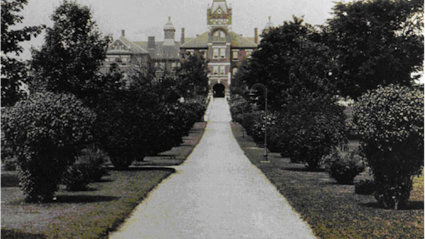
1876. The provincial government opened its first asylum for individuals with developmental disabilities in 1876. It was initially called “Orillia Asylum for Idiots” and then renamed Ontario Hospital School. At its peak in 1968, it housed approximately 2000 residents, but the institute was frequently overcrowded (Rossiter & Clarkson, n.d.). The institution was eventually renamed the Huronia Regional Centre, and several lawsuits were launched by former residents against the centre in 2010 due to inhumane treatment inside the institution (Rossiter & Clarkson, n.d.).
The institution's original aim was to be a Training School for juveniles, but as eugenics theories gained ground in the 1900s with support from important Canadian figures such as Dr. Helen MacMurchy, and Dr. C. Hincks, the institution became more about segregating the "feeble-minded" from the rest of society for the rest of their lives (Wheatley, 2013). Many of the children in Orillia came from lower social classes or were orphans, while those from upper classes often went to the New York State Idiot Asylum (Wheatley, 2013). However, Orillia also housed a variety of people with disabilities of different ages, as well as "indigents" (Simmons, 1982 as cited in Rossiter & Clarkson, n.d.). Like in many other institutions across Canada, patients were expected to perform duties such as household duties, farming, or clothing production (Rossiter & Clarkson, n.d.), as a type of therapy. Many incidents of abuse have been recorded at the institutions. Pierre Berton of the Toronto Star wrote in 1960:
"Remember this: After Hitler fell, and the horrors of the slave camps were exposed, many Germans excused themselves because they said they did not know what went on behind those walls: no one had told them. Well, you have been told about Orillia" (Berton, 1960, as cited in Rossiter & Clarkson, n.d.)
Although Ontario never passed sterilization policies, the impact of the eugenics movement is clearly demonstrated in Ontario through institutions such as Orillia. Many parallels can be drawn with institutions in Western Canada.
-Erna Kurbegovic and Colette Leung
Government of Ontario. (2008). History of Developmental Services. Ministry of Community and Social Services. (Website). Retrieved from http://www.mcss.gov.on.ca/en/dshistory/.
Wheatley, T. (2013). The Asylum for Idiots and Feeble-Minded, Orillia, 1876 (Website). Retrieved from http://www.thelmawheatley.com/the-asylum-for-idiots-and-feeble-minded-orillia-1876
Rossiter, K, & Clarkson, A. (n.d.). Opening Ontario's "Saddest Chapter:" A Social History of Huronia Regional Centre. Retrieved from http://cjds.uwaterloo.ca/index.php/cjds/article/view/99/153
 1869:
Galton publishes Hereditary Genius
1869:
Galton publishes Hereditary Genius
 1871:
Charles Darwin publishes The Descent of Man
1871:
Charles Darwin publishes The Descent of Man